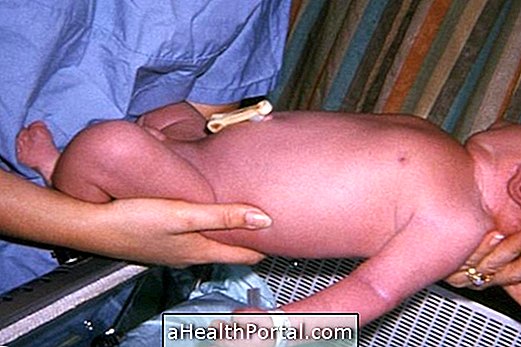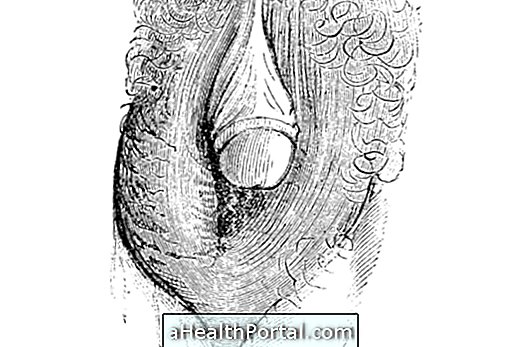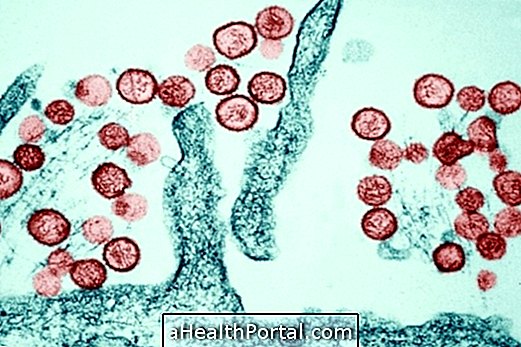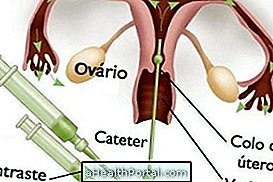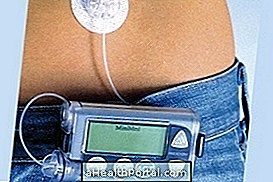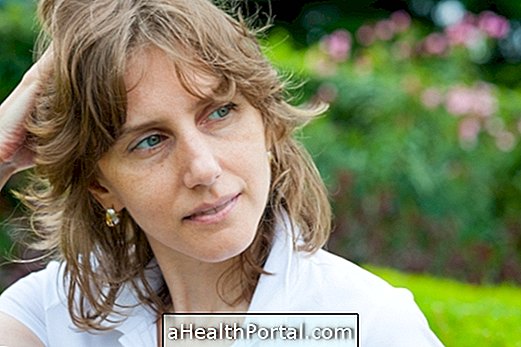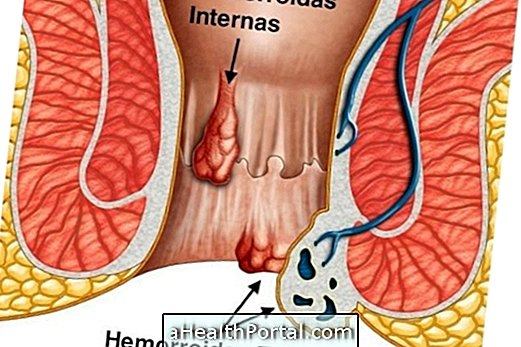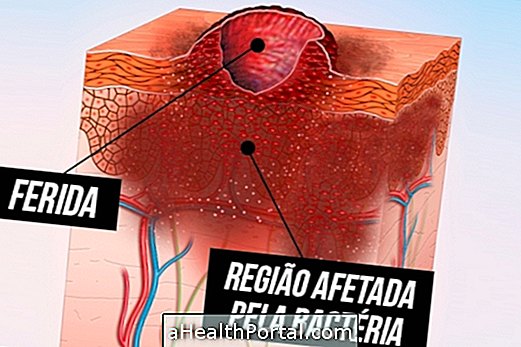After learning that the baby has Down Syndrome, parents should calm down and get as much information about Down Syndrome as possible, what are their characteristics, what are the health problems that the baby may face and what are the possibilities of treatments that can help promote autonomy and improve the quality of life of your child.
There are parents' associations such as the APAE, where you can find quality information, trust and also the professionals and therapies that can be indicated to assist in the development of your child. In this type of association it is still possible to find other children with the syndrome and their parents, which may be useful to know the limitations and possibilities that the person with Down syndrome may have.

1. How long do you live?
The life expectancy of a person with Down syndrome is variable, and may be influenced by congenital defects, such as heart and respiratory, for example, and appropriate medical follow-up. Previously, in many cases life expectancy was no more than 40 years, however, today, with advances in medicine and improvements in treatments, a person with Down syndrome can live more than 70 years of age.
2. What tests are needed?
After confirming the diagnosis of the child with Down syndrome, the doctor may request additional tests, if necessary, such as: karyotype to be performed up to the first year of life, echocardiogram, blood count and thyroid hormones T3, T4 and TSH.
The following table indicates which tests should be done, and at what stage they should be performed during the life of the person with Down Syndrome:
| At birth | 6 months and 1 year | 1 to 10 years | 11 to 18 years | Adult | Old man | |
| TSH | yea | yea | 1 x year | 1 x year | 1 x year | 1 x year |
| Blood count | yea | yea | 1 x year | 1 x year | 1 x year | 1 x year |
| Karyotype | yea | |||||
| Glycemia and triglycerides | yea | yea | ||||
| Echocardiogram * | yea | |||||
| View | yea | yea | 1 x year | every 6 months | every 3 years | every 3 years |
| Hearing | yea | yea | 1 x year | 1 x year | 1 x year | 1 x year |
| X-ray of the column | 3 and 10 years | If necessary | If necessary |
* The echocardiogram should only be repeated if a cardiac change is found, but the frequency must be indicated by the cardiologist who accompanies the person with Down Syndrome.
3. How is delivery?
The birth of a baby with Down Syndrome may be normal or natural, however, a cardiologist and a neonatologist should be available if he or she is born before the due date, so parents sometimes choose cesarean section. that these doctors are not always available at all times in hospitals.
Learn what you can do to recover from the fastest cesarean section.
4. What are the most common health problems?
The person with Down Syndrome is more likely to have health problems like:
- In the eyes: Cataract, pseudo-stenosis of the lacrimal duct, refractive disorder, being necessary to wear glasses from an early age.
- In the ears: Otitis frequent that can favor deafness.
- In the heart: Interatrial or interventricular communication, atrioventricular septal defect.
- In the endocrine system: Hypothyroidism.
- In the blood: Leukemia, anemia.
- In the digestive system: Alteration in the esophagus that causes reflux, duodenal stenosis, aglanglionar megacolon, Hirschsprung's disease, Celiac disease.
- In muscles and joints: Weakness of the ligaments, subluxation in the neck, dislocation of the hip, instability of the joints, which may favor dislocations.
Because of this it is necessary medical accompaniment for life, carrying out examinations and treatments whenever any of these changes appear.

5. How is the development of the child?
The muscle tone of the child is weaker and so the baby may take a little longer to hold the head alone and so parents should be very careful and always support the neck of the baby to avoid dislocation of the neck and even an injury in the spinal cord.
The psychomotor development of the child with Down's syndrome is a little slower and so it can take time to sit, crawl and walk, but treatment with psychomotor therapy can help her reach these developmental milestones faster. This video has some exercises that can help you keep your workout at home:

By age 2, the baby tends to have frequent episodes of influenza, cold, gastroesophageal reflux and may have pneumonia and other respiratory illnesses if not properly treated. These babies can take the flu vaccine every year and usually take the Respiratory Sinus Virus vaccine at birth to avoid the flu.
A child with Down syndrome may start talking later after age 3, but speech therapy can help a lot by shortening that time, making it easier for the child to communicate with family and friends.
6. How should the food be?
The baby with Down Syndrome can suck in the breast but due to the size of the tongue, the difficulty of coordinating the suction with breathing and the muscle that gets tired fast, he may have some difficulty suckling, although with a bit of training and patience she may also be able to nurse exclusively on the chest.
This training is important and can help the baby strengthen the muscles of the face that will help him speak faster, but in any case, the mother can also withdraw the milk with a pump and then offer it to the baby with a bottle.
Check out the Complete Breastfeeding Guide for Beginners
Exclusive breastfeeding is also recommended up to 6 months when other foods can be introduced. You should always prefer healthy foods, avoiding soda, fat and frying, for example.
7. How is school, work and adult life?

Children with Down Syndrome can study in the regular school, but those with a lot of learning difficulties or mental retardation benefit from the special school. Activities such as physical education and art education are always welcome and help the person understand their feelings and express themselves better.
The person with Down Syndrome is sweet, outgoing, sociable and also able to learn, can study and can even go to college and work. There are stories of students who did ENEM, went to college and can date, have sex, and even marry and the couple can live alone, counting on each other's support.
As the person with Down Syndrome tends to gain weight regularly, physical activity has many benefits, such as maintaining the ideal weight, increasing muscle strength, helping prevent joint damage and facilitating socialization. But to ensure safety while practicing activities such as gym, bodybuilding, swimming, horse riding, the doctor may request X-rays more often to evaluate the cervical spine, which can suffer dislocations, for example.
The boy with Down Syndrome is almost always infertile, but girls with Down Syndrome can get pregnant but have a good chance of having a baby with the same Syndrome.

